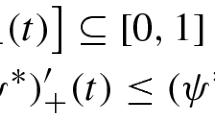Abstract
This paper is concerned with the rank-deficient problem of least squares adjustment models with inequality constraints. First, the problem under study is transformed into a linear complementarity problem (LCP) with a P0-matrix (P0-LCP), which is a non-symmetric matrix whose principal minors are all nonnegative. Second, both Mangasarian’s symmetric successive over relaxation and a perturbed LCP with arbitrarily small perturbation are employed to solve the P0-LCP. As a result, a new iterative algorithm for rank-deficient adjustment models with inequality constraints is presented, and its convergence is proven. Finally, examples are given to demonstrate the efficiency of the proposed algorithm. It is shown that the proposed algorithm can not only assess the stability of points but also provide additional adjustment criteria to guarantee the uniqueness of solutions to the problem of rank-deficient free-network adjustment.





Similar content being viewed by others
References
Ahn B (1981) Solution of nonsymmetric linear complementarity problems by iterative methods. J Optim Theory Appl 33(2):175–185
Bai Z (1996) The convergence of parallel iteration algorithms for linear complementarity problems. Comput Math Appl 32:1–17
Berman A, Plemmons R (1979) Nonnegative matrices in the mathematical sciences. Academic Press, New York
Björck A (1996) Numerical methods for least squares problems. SIAM, Philadelphia
Cottle R, Dantzig G (1968) Complementary pivot theory of mathematical programming. Linear Algebra Appl 1:103–125
Cryer C (1971) The solution of a quadratic programming using systematic overrelaxation. SIAM J Control 9:385–392
Fang X (2014) On non-combinatorial weighted total least squares with inequality constraints. J Geodesy 88(8):805–816
Fang X, Wu Y (2016) On the errors-in-variables model with equality and inequality constraints for selected numerical examples. Acta Geod Geoph 51:515–525
Fiedler M (1986) Special matrices and their applications in numerical mathematics. Martinus Nijhof Publishers, Dordrech
Fletcher R (1993) Resolving degeneracy in quadratic programming. Ann Oper Res 47:307–334
Fritsch D (1985) Some additional informations on the capacity of the linear complementarity algorithm. In: Grafarend EW, Sanso F (eds) Optimization and design of geodetic networks. Springer, Berlin, pp 169–184
Koch KR (1982) Optimization of the configuration of geodetic networks. In: Proceedings of the international symposium on geodetic networks and computations, München, DGK series B, vol 258/III
Koch KR (1999) Parameter estimation and hypothesis testing in linear models. Springer, Berlin, pp 48–59
Koch A (2006) Semantische integration von zweidimensionalen GIS-Daten und Digitalen Geländemodellen. Ph.D. thesis, Universität Hannover, DGK series C, No. 601
Kostreva M (1989) Generalization of Murty’s direct algorithm to linear and convex quadratic programming. J Optim Theory Appl 62(1):63–76
Kuhn H, Tucker A (1951) Nonlinear programming. In: Proceedings of 2nd Berkeley symposium. University of California Press, Berkeley, pp 481–492
Lemke C (1965) Bimatrix equilibrium points and mathematical programming. Manag Sci 11:681–689
Lu G, Krakiwsky E, Lachapelle G (1993) Application of inequality constrained least squares to GPS navigation under selective availability. Manuscr Geod 1:124–130
Mangasarian O (1977) Solution of symmetric linear complementarity problems by iterative method. J Optim Theory Appl 22(4):465–487
Murty K (1974) Note on a Bard-type scheme for solving the complementarity problem. Opsearch 11:123–130
Pang J (1982) On the convergence of a basic iterative method for the implicit complementarity problem. J Optim Theory Appl 37:149–162
Peng J, Zhang H, Shong S, Guo C (2006) An aggregate constraint method for inequality constrained least squares problems. J Geodesy 79:705–713. https://doi.org/10.1007/s00190-006-0026-z
Roese-Koerner L (2015) Convex optimization for inequality constrained adjustment problems. Schriftenreihe des Instituts für Geodäsie und Geoinformation der Rheinischen Friedrich-Wilhelms Universität Bonn, ISSN 1864-1113, Nr. 50, Bonn 2015
Roese-Koerner L, Schuh W (2014) Convex optimization under inequality constraints in rank-deficient systems. J Geodesy. https://doi.org/10.1007/s00190-014-0692-1
Roese-Koerner L, Devaraju B, Sneeuw N, Schuh W (2012) Stochastic framework for inequality constrained estimation. J Geodesy 86(11):1005–1018. https://doi.org/10.1007/s00190-012-0560-9
Song Y, Zhu J, Li Z (2010) The least-squares estimation of adjustment model constrained by some non-negative parameters. Surv Rev 42(315):62–71. https://doi.org/10.1179/003962610X12572516251367
Tseng P (1995) On linear convergence of iterative methods for the variational inequality problem. J Comput Appl Math 60:237–252
Wenxian ZENG, Jingnan LIU, Yibin Yao (2015) On partial errors-in-variables models with inequality constraints of parameters and variables. J Geodesy 89(2):111–119
Werner H, Yapar C (1996) On inequality constrained generalized least squares selections in the general possibly singular Gauss-Markov model: a projector theoretical approach. Linear Algebra Appl 237(238):359–393. https://doi.org/10.1016/0024-3795(94)00357-2
Xu P (1995) Testing the hypotheses of non-estimable functions in free net adjustment models. Manuscripta Geodaetica 20(2):73–81
Xu P (1997) A general solution in geodetic nonlinear rank-deficient models. Bollettino di geodesia e scienze affini 1:1–25
Xu P, Cannon E, Lachapelle G (1999) Stabilizing ill-conditioned linear complementarity problems. J Geodesy 73:204–213. https://doi.org/10.1007/s001900050237
Zhu J, Santerre R, Chang X (2005) A Bayesian method for linear, inequality-constrained adjustment and its application to GPS positioning. J Geodesy 78:528–534. https://doi.org/10.1007/s00190-004-0425-y
Acknowledgements
This paper was supported by the National Natural Science Foundation of China (Project Nos. 41574006, 41674009, and 41674012).
Author information
Authors and Affiliations
Corresponding author
Rights and permissions
About this article
Cite this article
Song, Y. A new iterative algorithm for a rank-deficient adjustment model with inequality constraints. J Geod 93, 2637–2649 (2019). https://doi.org/10.1007/s00190-019-01324-z
Received:
Accepted:
Published:
Issue Date:
DOI: https://doi.org/10.1007/s00190-019-01324-z




